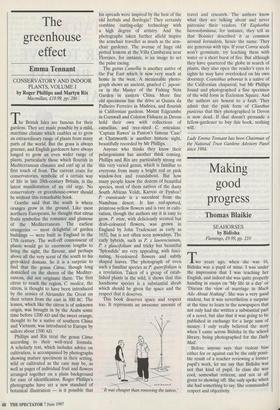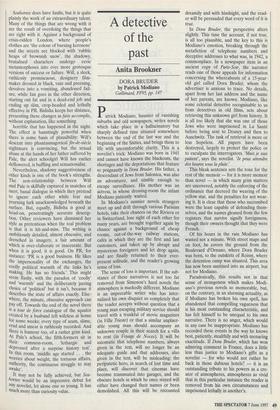Making good progress
Thomas Blaikie
SEAHORSES by Bidisha Flamingo, £9.99, pp. 210 Two years ago, when she was 16, Bidisha was a pupil of mine. I was under the impression that I was teaching her English, and indeed she was quite properly handing in essays on 'My life in a day' or 'Discuss the view of marriage in Much Ado About Nothing'. She was a very good student, but it was nevertheless a surprise at the time to learn in the newspapers that not only had she written a substantial part of a novel, but also that it was going to be published in exchange for a large sum of money. I only really believed the story when I came across Bidisha in the school library, being photographed for the Daily Mail.
Before anyone says that violent bias either for or against can be the only possi- ble result of a teacher reviewing a former pupil's work, let me say that Bidisha was not that kind of pupil. In class she was cool, somewhat reticent, and not at all given to showing off. She only spoke when she had something to say. She commanded respect and objectivity. Seahorses does have faults, but it is quite plainly the work of an extraordinary talent. Many of the things that are wrong with it are the result of overdoing the things that are right with it. Against a background of crisis-ridden London, where people's clothes are 'the colour of burning kerosene' and the streets are blocked with 'rubble heaps of brownish snow', the shadowy, brutalised characters undergo eerie metamorphoses into ever more grotesque versions of success or failure. Will, a sleek, ruthlessly promiscuous, designery film- maker dressed in black, vain and preening, devolves into a vomiting, abandoned fail- ure, while Ian goes in the other direction, starting out fat and in a dead-end job and ending up slim, crop-headed and lethally effective in PR. Bidisha keeps her distance, presenting these changes as faits accomplis, without explanation, like something horrible that has happened in the night. The effect is hauntingly powerful when there is some basis of plausibility: Will's descent into phantasmagorical fin-de-siècle nightmare is convincing, but the sexual abuse at the hands of her father suffered by Pale, the alert schoolgirl Will has earlier deflowered, is baffling and sensationalist.
Nevertheless, shadowy suggestiveness of other kinds is one of the book's strengths. The non-relationship between Will and Pale is skilfully captured in snatches of inert, banal dialogue in which they pretend to ignore each other while fear and Yearning lurk unacknowledged beneath the surface. But, equally, Bidisha is good at head-on, penetratingly accurate descrip- tion. Other reviewers have dismissed her Style as pretentious when the real problem is that it is hit-and-miss. The writing is ambitiously detailed, almost obsessive, and drenched in imagery, a fair amount of Which is over-elaborate or inaccurate. But when it is good, it is good. On PR, for instance: 'PR is a good business. He likes the impersonality of the exchanges, the Coolly political warmth of the links he's making. He has no friends.' This might seem flashy, with the paradox of 'coolly' and 'warmth' and the deliberately jarring choice of 'political' but it isn't, because it describes the state of affairs exactly. Else- where, the minute, obsessive approach can pay off. Towards the end of the novel there is a tour de force catalogue of the squalor created by a husband left wifeless at home for some weeks; every type of scum, slime, crud and smear is ruthlessly recorded. And there is humour too, of a rather grim kind. At Pale's school, the fifth-formers sit in their common-room, 'lethargic and depressed after a surprise history test'. In this room, 'middle age started . . . the worries about weight, the tortuous affairs, authority, the continuous struggle to stay awake'.
It may not be fully achieved, but Sea- horses would be an impressive debut for any novelist, let alone one so young. It has much more than curiosity value.











































































 Previous page
Previous page